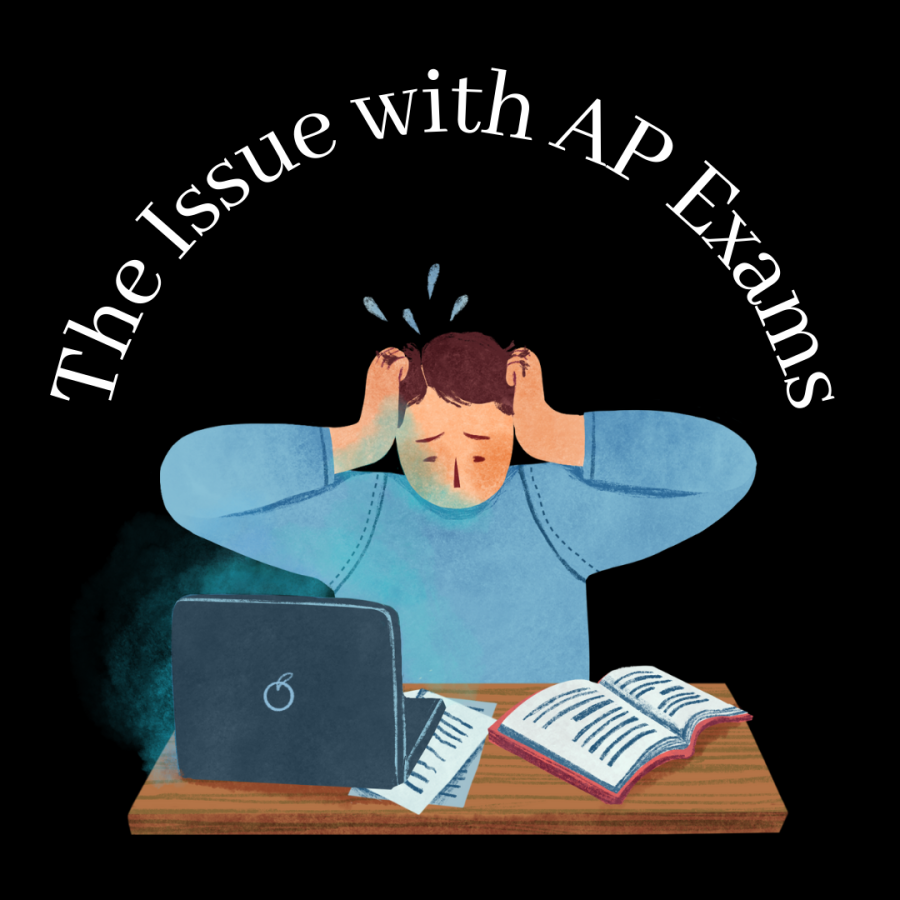The College Board Exam schedule is not fair to students
Staff Graphic by Kendall Wilson
As AP exam week commences, students in the block schedule struggle to feel prepared.
During the month of May, students enrolled in Advanced Placement classes anticipate upcoming College Board Exams. Over the past two decades, the number of high school students enrolled in Advanced Placement courses has greatly increased. However, the article also asserts that many students are also failing the exams. There can be many reasons for a student to fail the final test, but, is it possible that some test-takers have an easier time preparing than others?
Wakefield High School, like many other schools, follows the block schedule. This means that we have four 90-minute classes a day. We switch out our classes at the start of each semester; one beginning in August and the other in January. Near the end of the fall semester, right before switching out classes, students take finals for all courses except AP classes, because nationally, all College Board exams are scheduled to take place in May. AP exams are an annual event that do not provide flexibility for schools that follow our type of schedule. Though this schedule can be nice, it can be a major burden for AP students, especially those who took their classes in the fall.
It’s inevitable that fall-semester students will forget some of what they’ve learned and have to reteach themselves the content before the May exam. As material is only superficially grasped, it’s only normal that it’s quickly forgotten. In Ebbinghaus’ analysis of our forgetting curve, it’s explained that without any reinforcements of past knowledge, information is quickly lost, maybe quicker than expected. He found that we forget roughly 56 percent of what we learned after one hour, 66 percent after one day, and 75 percent after six days.
This presents a real disadvantage for fall students, as the content is fresher in spring-semester students’ minds. This schedule is also difficult for fall students as they may have a harder time asking teachers for help when they’re not actively taking the course.
All of these challenges can start to cause a serious sense of stress and pressure. According to New York University, 49 percent of all students face stress on a daily basis. With this added pressure, this number can dramatically increase. This stress can contribute to what is known as test anxiety. By definition, test anxiety is a psychological condition where people experience extreme anxiety in testing situations. In small amounts, test anxiety can actually be beneficial in keeping your mind awake and, in turn, helping test-takers perform better. However, in most cases this is harmful; even if someone has the skills and knowledge to do well, their anxiety can impair their focus and cause them to draw a blank.
This is not to say that spring-semester students do not face test anxiety, nor that they don’t also face challenges while preparing for their final exam. Because of the test being placed in May, and most schools being let out in late May or early June, spring-semester students sometimes don’t have as much time to learn all of the content in time for the exam. In addition, many spring semester classes lose days early on due to inclement weather causing teachers to eliminate lessons that would support high AP scores. For spring semester AP courses, these factors lead to a need to cram information to pass, which can lead to burnout and a withdrawal of overall interest in trying for a good score. This also places teachers in a demanding position, having to make sure all of their students are comfortable with a lot of content in a limited amount of time.
Though AP classes can be very beneficial to the future of many high school students, it goes without saying that the May exams still have room for improvement. I believe it’s important that the College Board takes the block schedule into consideration and offer some more flexible options–they already proved the ability to be flexible during the 2020 exam season and again last year during the 2021 season. A reasonable solution could include an exam period at the end of the fall semester to benefit those with a five-month break, and along with this, a later exam period for spring semester students to benefit those who are feeling rushed and overwhelmed.






Stephen • Feb 15, 2023 at 2:37 am
Hi Kendall, I graduated from high school in 2012, and we were on the block schedule. Even though I love block scheduling and think it does a better job of preparing students for how courses are taught in college, I definitely agree with you about the resulting need for fall AP exams, and I’m glad I’m not the only one who felt annoyed by having too much time to forget the material between fall AP courses and the May exams. In fact, I remember that there were special review sessions in the spring for students who had taken AP Biology in the fall, and honestly I don’t know whether or not the teacher was even paid for that extra work. I actually tried to suggest for our school to move the AP science classes to the spring instead of the fall, but as more high schools use block scheduling, at some point I’m sure it would make a lot more sense to add AP exams in the fall (as well as to delay the ones in the spring by a week or so), at least for certain courses. For me personally, review to avoid forgetting things was especially essential for AP Biology because it covered so much material, but there may be other AP classes that could benefit as well. (I didn’t take AP World History, or any AP social studies other than psychology for that matter.)
Yusha Ahsan • May 12, 2022 at 1:50 pm
This article is amazing!
Millie Monahan • May 11, 2022 at 10:06 am
Yay Kendall!!! Your writing has been growing so much and I love reading everything you write <3
zoe ruden • May 12, 2022 at 12:51 pm
hi millie !! and i agree, kendall did amazing
Emily Dudash • May 10, 2022 at 2:14 pm
I LOVE this article and completely agree with everything you said!